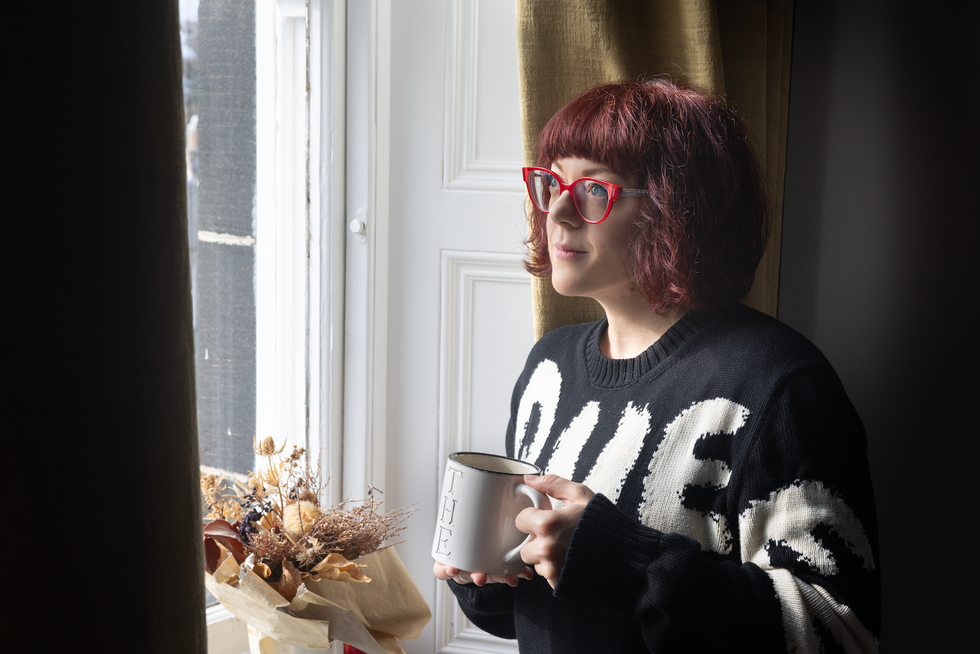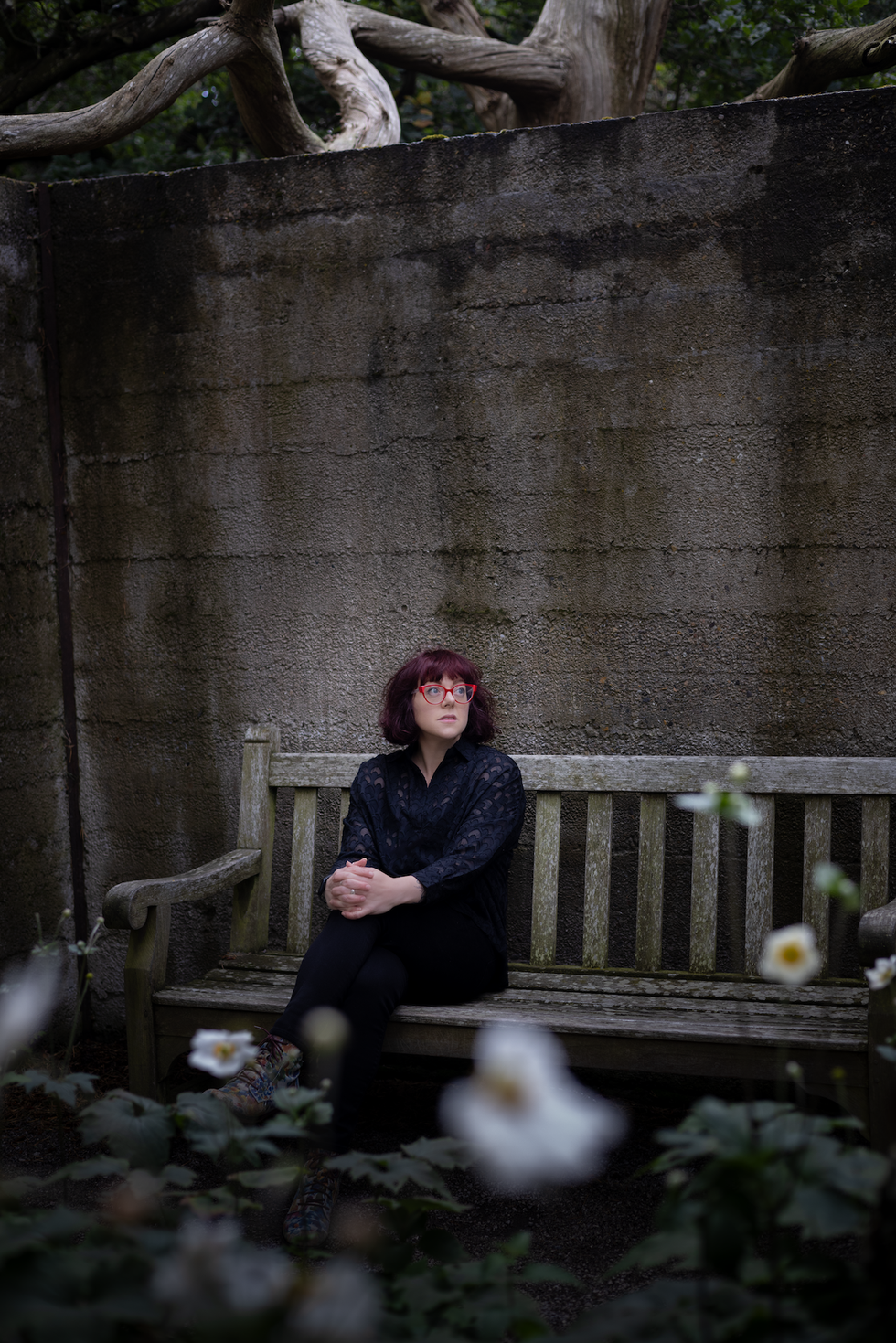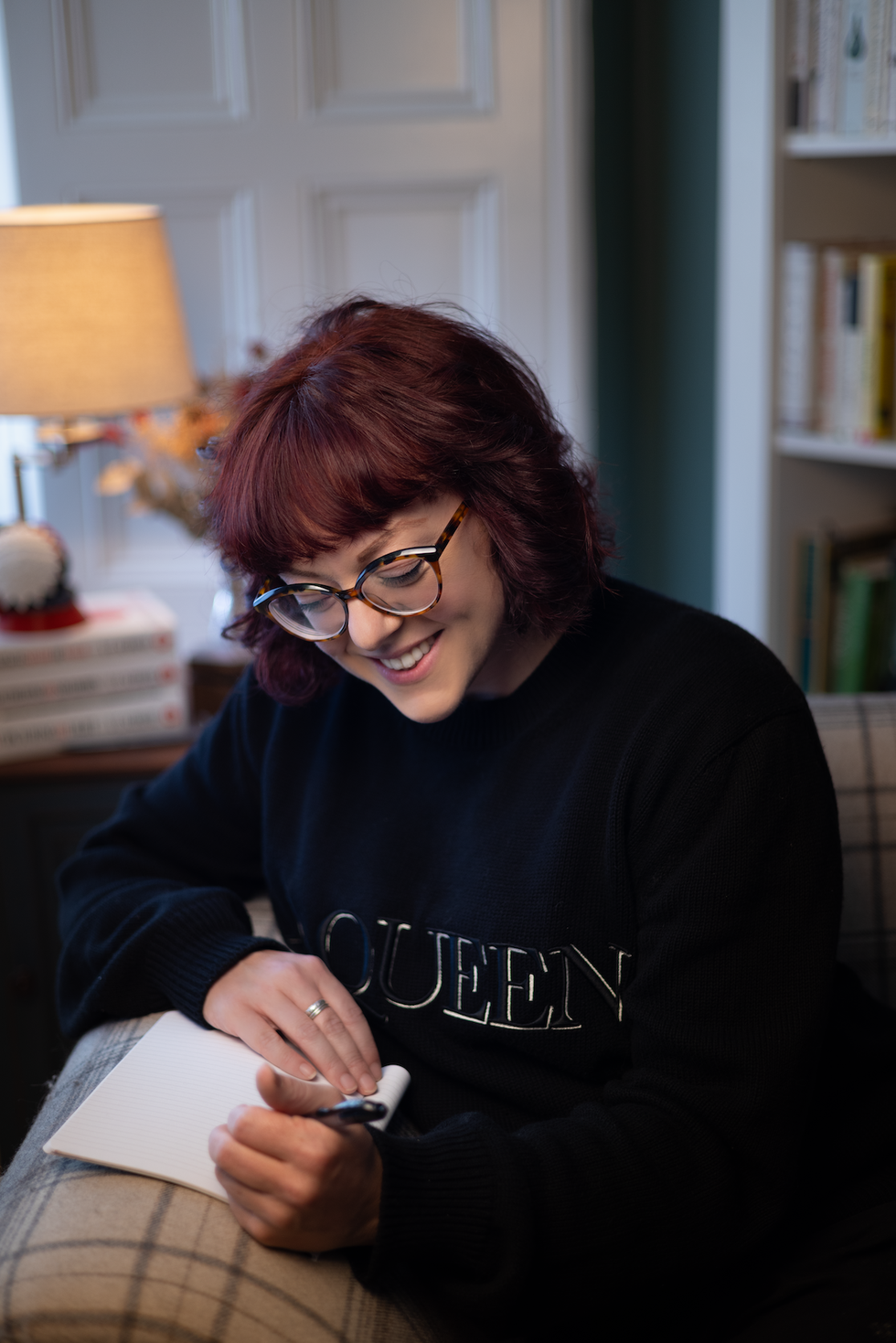V.E. Schwab Is Rewriting the Rules of Fantasy (And Maybe Life Itself)
“I am somebody who wants the world to be stranger than it is,” says Victoria “V.E.” Schwab, her voice dipping toward melancholy as she caps off the sentence. It’s a curious thought she presents—considering the world is, in fact, consistently and maddeningly bizarre—and yet one approaching the truth uniting the author’s works of fantasy, including the bestselling sensation The Invisible Life of Addie LaRue and her latest, the first entry in a new series: The Fragile Threads of Power.
These stories, which have built Schwab a sizable audience of not only Instagram followers (365K and climbing), but active, engaged readers across platforms and continents, are grounded in what Schwab calls a “point of departure” from reality. They are each set in a version of the world we know, but with an asterisk. So: In Addie, there is New York City, and there is Paris, but there is also a god made of shadow who grants wishes that double as curses. In Threads, there is London, but it is carved into multiversal quadrants, versions in various stages of grandeur and ruin: Red London, White London, Grey London, and Black London. There is magic in Schwab’s work, but it exists along familiar contours, never claiming faraway lands from which to flourish.
Schwab’s been, as she puts it, “in this game” since 2009, pumping out books from the age of 19, work that she marks by three essential characteristics: 1) “deeply fleshed-out” characters; 2) a “slow” initial hundred pages, “because I’m laying the board for a game I’m asking you to play”; and 3) writing with a “very specific lyrical style.” She adds, with something of a shrug and a smile, “If you don’t like these three things, then my books probably aren’t for you.”
More From ELLE

She’s right, at least in part. Her characters are beloved, if not exactly naturalistic. Her beginnings can grow turgid, though rewarding for the devoted. And her prose is that of a young poet, fond of frequent line breaks and overwrought descriptions but with a slippery, hypnotic cadence. Still, none of these factors are what ultimately make Schwab’s work so enticing. The appeal is not in the “stranger” world that she and her readers desire, but a landscape in which the real world’s power might become comprehensible—and therefore, finally, manageable.
Schwab knew something of bifurcated realities as a child: She grew up between San Jose, California, and Nashville, Tennessee, moving back and forth repeatedly throughout her first 18 years. An only child, she considered herself self-sufficient well before she hit adulthood, and acquired friends as a natural “social mimic” who was “very, very intense in everything I did,” she says. She attended an all-girls preparatory school in Nashville, and she claims she “never” wanted to be a novelist; she wanted to be a World Cup soccer player.
But Schwab also enjoyed the expansive isolation of her own mind, where imagined realities could nurture a sense of being “alone without feeling lonely.” When she first enrolled in a university, she attended for astrophysics before “leapfrogging around different departments” and signing her first book deal, which might as well have included her signature on the bottom line of life itself: A traditional career path would never be her lot. She’d been rooting around for this path for years, arguably ever since she started reading.
“The first time I felt transported by a book, my reaction was of two minds,” she says. “It wasn’t even just to be transported. There was a part of my brain at the time that was like, This is power.” She continues, “I was intoxicated by the idea of the manipulation of words and [what] that could do to somebody else’s mind far before I ever wrote a novel.”
Even as a teenager, Schwab was furious to have these powers of hers taken seriously. I ask if, in the years since she’s become a traditional publishing success story, she’s perhaps aged out of that insecurity. She replies, “I don’t think you can age out of it when you start in young-adult, and when you’re a woman who writes in fantasy.”
As a genre, the young-adult label fit her work like a girdle, squeezing it into a specific shape but smoothing the interesting bits along the way. Her first book, 2011’s The Near Witch, was a fairytale with a teenage protagonist, and “at the time, that automatically made it YA,” Schwab says, adding, “YA can be a beautiful section of the market. But it does feel like it has a lot of rules.” She was told that her books were unlikely to sell well—largely because she didn’t write within the strict parameters of the romance subgenre—and that each consecutive YA work would have approximately “two to six months to succeed” before bookshelves would be cleared for new entries, and hers lost to the ether of unlikely discovery. She continues, “The most traumatized authors I know are authors who are either in or have come through YA.”
When Schwab made the leap to adult fiction with 2013’s Vicious, she expected a similar timeline for supposed “success.” After two months, she emailed her editor, assuming the deadline had arrived: They’d now decide if she’d sold enough copies to cinch herself another book deal. Her editor recommended, instead, that they circle back after two years. “That was this realization that books got to live longer lives in adult, and find readers at a slower rate,” Schwab says. “I needed that advantage because Vicious was never a bestseller, but it sold the same number of copies every year for seven or eight years.”
The publication of Vicious also announced the arrival of her twin literary identities: Victoria Schwab, with which she’d continue to release books like the Monsters of Verity and Cassidy Blake series, and V.E. Schwab, under which she’d pen her popular fantasies such as the Shades of Magic trilogy, the Villains books, the newly launched Threads of Power series, and her stand-alone novels including 2020’s Addie LaRue and 2022’s Gallant. (Some books would be released under Victoria and later under V.E.) The pseudonym was both a marketing tool and a self-protective measure: Such a gender-neutral name allowed her—in theory, anyway—to reach new audiences, as well as to create “a version of me that lives rent-free in people’s heads,” she explains. To her friends and family, she’s Victoria. But online, and to her many followers, she’s V.E., maker of tangential realities, not “the human who wakes up at 7 a.m. and walks my dog on the beach.” In other words, V.E. could have power, while Victoria could live.
During the height of the pandemic, Addie LaRue took off—a miracle Schwab attributes, not entirely in jest, to its “very sexy villain.” But she recognizes the book was also “inextricable from the time in which it was published.” After its initial release in October 2020, Addie hit the New York Times bestseller list, but it was only after popular book-centric creators on TikTok (a.k.a. BookTok) championed the novel that it became a true phenomenon. Addie—about a twenty-something girl cursed to be forgotten by everyone she meets throughout multiple centuries, but who falls in love nevertheless—was the kind of book readers wanted, and perhaps needed, during COVID: “defiantly hopeful,” as Schwab puts it, and a tale of survival across borders and eras and unbeatable odds.
Unprompted, Schwab suggests that this, actually, is the real unifying theme across her books: the so-called “mastery” of death. She explains that, as a child, she fretted over her father, a type-one diabetic whose blood sugar levels she helped to monitor, and whose tenuous health created an environment where constant observation was the key to life itself. She concludes, “I just became convinced, if I pay enough attention to everything happening around me, I can control everything. And if you think about what writing novels is, it’s exercising control.”
She admits, but does not apologize for, how this rationale might come across. It’s “manipulation,” she says, and “wanting to have some power over a reader’s mind,” even if “it sounds narcissistic to put it that way.” Of course, creating fictional realities is an act of narcissism, perhaps one of the few narcissistic acts that might also serve a benevolent purpose. But this doesn’t upset Schwab. On the contrary, it thrills her. She talks of feeling powerless as a child, and how she searched rock faces in California hoping to find key holes, anything that might confirm her doubts that reality wasn’t—or shouldn’t be—what it seemed. When she came out as gay in her late twenties, it was further confirmation to herself that reality had always been different than what she’d initially perceived. Doors were opening. Light was coming through. As she chronicled in a coming-out essay for Oprah Daily in 2020, she exited a metaphorical “house,” and the world around her became suddenly stranger, and all the more beautiful.
But Schwab—and the world itself—did not actually become stranger; it was the perception of Schwab herself that expanded.
“Good fantasy is only escapism for people who already have everything that they need and want in reality,” Schwab says. In other words: What the author, and her audience, really yearn for is the power—the tools of “manipulation,” as it were—to rewrite the stubborn, heartbreaking rules that govern our real world. It’s not that reality isn’t sufficiently strange; it’s that it’s so very hard to control.
Schwab is currently on book tour for The Fragile Threads of Power, a nearly six-week trip spanning multiple cities across the U.S., Ireland, and the U.K. It’s a grueling schedule, especially as she’s much more accustomed to a regular writing routine from her favorite coffee shop in Edinburgh, Scotland, where she lives when she’s not traveling. “I like living in old places, in places that haven’t felt the need to choose between the realistic and the supernatural,” she says, citing her neighbors’ affection for ghost stories. “I feel like growing up in the States, by virtue of how young a country it is…it feels so resistant to the supernatural. You either have to be a believer or a non-believer.”
This split down the middle is a familiar source of both the author’s ire and inspiration. There’s always a separation—Victoria and V.E., reality and imagination, the strange and mundane—that Schwab wants to smother, or otherwise pull taut between her fingers like twine. And it extends to her publishing career, where she’s often felt shoved into disparate categories, whether on account of her success (or lack thereof); her gender; her sexuality; or her genre of choice. She wants the freedom just to be, to play, to write and be accepted for it without caveat, much in the manner of her literary icons: Imagine, if you will, Neil Gaiman or Stephen King ever needing introduce themselves as “best-selling male fantasy authors.”
“It feels like I’m stuck with this choice,” she says. “I either downplay pieces of my identity: I take a gender-neutral pseudonym as I did. I try to be mainstream. I try to be palatable, and I still get disqualified. So then I try to be proud, and I try to be loud, and I try to be aggressively femme and gay, and I still get disqualified, where I still get put in a subcategory. And I just want to be like, How big do you have to get as a fantasy author before you don’t have to be caveated as something smaller?”
In the midst of this specific struggle, Schwab also has to contend with the demands of a shifting industry: Readers have come to expect a relationship with her over social media, whether in the form of her Instagram or her newsletter, featuring the cheeky title “The Visible Life of V.E. Schwab.” And she recognizes that even these engaged followers don’t necessarily belong to the same category. Some are Addie fans; others come for Shades of Magic; still others clamor for the third and final entry in her Villains series. Because she hops between books and series and settings, her audience is not a “homogenous” one. “Sometimes I get very panicky,” she admits, “because I think I can’t appease them all because I only write one book at a time.”
And she feels, yes, “an immense pressure to perform author-hood,” she says. “I always am like, the person I’m most jealous of in this entire world is Donna Tartt. Talk about a person who’s just, ‘Take the myth of me and run! You’ll never see me.’ I’ll say to my friends, like, ‘What a dream. What a dream to just be a mythological figure.’”
Of course, she seems to amend this notion the next time we speak: “The insanity-inducing thing is that I insist on being online. If I could not engage—but, to me, engagement is part of what I love.” It’s also part of the Sisyphean task of building a readership in an era where attention is a fickle currency. “The conversation I have with [my publicist] every week is like, Am I going to be relevant?”
Schwab yearns to have an end goal in sight, both in the context of her life and in her fiction. She outlines every book with a specific ending in mind; she never begins a project without having already decided on its finale. But getting to that ending—that’s where she loves to experiment. For these periods, she can play in the ‘what if’ she recalls from a memory ironed in her teenager brain, when she went walking along a wooden fence and stumbled upon a door just beyond it. Here, I’ll let the author tell it:
“There was a door standing upright in this empty yard, as if the rest of the house had been razed around it, but this door has not been razed. And I remember reaching the end of this fence and standing there and staring at this door. My mind was like, What if I open that door, and it’s not the yard on the other side? But that same ‘what if’ is what prevented me from opening the door. Because as long as I didn’t open the door, as long as I only lived in the ‘what if,’ there was a potential that I would open the door and see somewhere else. The moment I opened the door and didn’t see somewhere else, it would suck. It would be a return to the norm. ” Ending this anecdote, she summarizes, “And reading is living in the potential of what could be, and not in the confirmation of what is.”
This statement, like Schwab’s desire for a “stranger” world, is not an entirely accurate one. Reading—even, or perhaps especially, in the fantasy genre—confirms exactly “what is”: that the world is strange; that it is inhabited by dark and terrible forces; that behind every door there is the chance for change. But sometimes the best way of navigating such an utterly confounding reality is not by approaching it unarmed. As Addie, and Vicious, and Threads all prove, sometimes it takes magic to see the monsters clearly—and to finally beat them back.
Culture Writer
Lauren Puckett-Pope is a staff culture writer at ELLE, where she primarily covers film, television and books. She was previously an associate editor at ELLE.





